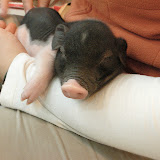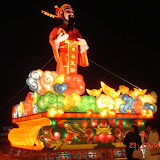The day before Chinese New Year, I went to one of the several outlets of the large French "Wal-Mart-style" store Carrefour in Beijing.
Before I tell you about the would-be pet for General Tsao, let me acknowledge to those familiar with Carrefour in China that I do know how ridiculously nuts it was to brave the wild, cart-wielding, desperate DVD-, chocolate-, clothing-, appliance-, and frozen-food-seeking masses in Carrefour on any Sunday, let alone the weekend of Spring Festival. For those of you who have never been, I'll say this: the store is a reminder that even though the middle class is only a tiny fraction of the Chinese population, a tiny fraction of 1.2 billion is a very large number. And they all shop at Carrefour on the weekends. And not one of them knows how to navigate a parking lot with either a shopping cart or a car.
Anyway, Carrefour is only the setting for this story, not the subject. The subject is the five sweet little piglets who were keeping each other warm in a cage on the floor of the pet shop just outside the checkout line of Carrefour. They were about 8 inches long, and they would pile on top of one piglet for about a minute and a half, then he could wiggle out and let another one move to the bottom, giving each one equal time in the coziest spot in the cage. I was immediately impressed by the cleverness and cooperative spirit the pigs demonstrated in this operation.
I started to wonder why this grocery store pet shop was selling farm animals, then I remembered - the Year of the Pig. Not only that, but the Golden Year of the Pig!! No more auspicious time to have some live ham in your home.
Pets are very trendy in some Chinese cities, but the problem is most Chinese families, unlike American families, do not see the animal as a real member of the home so much as a toy who also requires food. Once they grow from adorable puppy/ kitten/ chick to an adult animal, the pets tend to meet with misfortune. On a recent hike, a British man told me about a rabbit his Chinese roommate's girlfriend brought home one day. It was cute, as rabbits generally are. A few days later during dinner, the guy asked the roommate, what is this you made for us tonight? The roommate answered, "We decided the apartment really is too small for a rabbit." If he hadn't asked, the roommate would not have thought to tell him that this morning's pet was this evening's main course!
The one pet that seems to have staying power is the old man's bird - old Chinese men keep birds in cages and take them out for walks or bike rides and bring them to the park, where they compare their birds and cages with other old men.
Around Chinese New Year, you may find the year's animal on sale as a pet. Certainly some Chinese zodiac animals are more pet-worthy than others, and the pig actually stacks up better than most. Obviously the dog and the rabbit make easy pets, but they are so ordinary. Tigers are very cool, but decidedly inconvenient; rats and snakes don't even start out cute; and dragons are just too hard to find these days.
So there, in Carrefour, I considered the intelligent, adorable pig. The owner of the pet store swore up and down it wouldn't grow more than 18 inches long. Wouldn't it be sad without it's piggy brothers from the cage? Oh no, it will be happy with you because it will think you are it's mother, promised the owner, committing the unthinkable salesperson sin of calling the customer a middle-aged hog. And what would I feed it? Dog food, of course, just add a little water - pigs like moisture, she said. Oh, but I have a cat! No problem, pigs and cats get along in homes all the time. In fact, pigs are herd animals, and he will be happy to have a master animal to be the alpha.
A Chinese customer then came to look at the pigs, and the owner took them out of the cage. One friendly little piglet came over and sat on my lap, and with just a little petting, he fell asleep. I was charmed. So sweet! And soft! And warm! And my juvenile delinquent cat, General Tsao, is home by himself during the day, bored without my stimulating copmany. What more perfect playmate for him than a friendly mini-hog? As I pondered these delightful rationalizations for swine in the home, more Chinese customers arrived, lured by the perfectly entertaining combination of two weird things: a foreign girl who speaks Chinese, holding a piglet! I am proud to say my presence resulted in a sale: 880 RMB ($110) for one of these little guys!!!!!!
In the end, reason won out over the euphoria of pink skinned farm babies and the Golden Pig Year. You might think I'm crazy for ever considering it, but I defy you to check out these pictures without smiling!


















